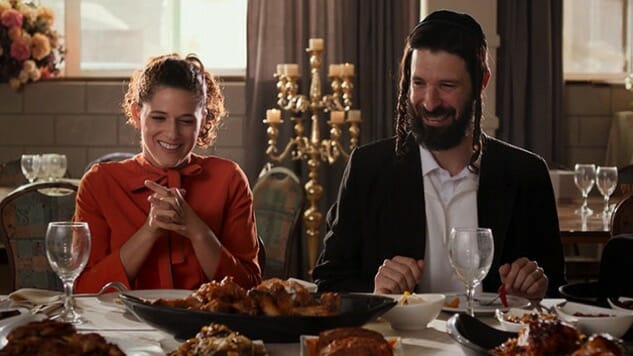Introducing Endless Mode: A New Games & Anime Site from Paste
Israeli filmmaker Rama Burshtein can approach religious faith from an angle few others can. At first a secular Jew, she became Orthodox at 25. In her films, first 2012’s Fill the Void and now The Wedding Plan (originally called Through the Wall in Israel), she synthesizes the insider and outsider perspective, presenting the Haredim in an informed, sympathetic light, without any infusion of dogma. Her characters grapple with the contradictions of their worldview, without the tinge of condescension or pity that almost always come in secular depictions of Orthodox Jews. The first Haredi woman to direct a feature for wide release, she provides a rare and valuable perspective—particularly since she also, you know, does good work.
Like Fill the Void, The Wedding Plan focuses on marriage mores within the Haredi community, though protagonist Michal (Noa Koler) is motivated to seek out a husband less by immediate family pressure than by an increasing itch to just check off that box in her life. She thinks she’s all set to do so, too… until her fiancé abruptly pulls out a month before the wedding. Rather than cancel, Michal figures, “I have a hall. I have a dress. The apartment is almost ready. It’s a small task for God to find me a groom.” And so she moves ahead with her plans, even as the date of the wedding draws near, and the prospects for meeting a game man grow slimmer.
This is the kind of setup one can easily picture a Hollywood rom-com working with in the ‘90s (decide for yourself whether it would star Julia Roberts or Meg Ryan). But while Burshtein’s script treats it with a light touch, it also takes Michal and her search seriously and respectfully. Koler, a newcomer, acts not with zany desperation, but with a believer’s assuredness, letting doubt creep in only at strategic, impactful moments. Mainstream movies often struggle to depict religious people three-dimensionally, but Michal’s journey is one even an unbeliever can understand. After all, cultural expectations aside, her basic desire for companionship is a universal one.
The Wedding Plan feels somewhat overlong at nearly two hours, much of which consists of various matchmaker’s dates with quirky men and a side pilgrimage to Ukraine. Its warmth and easygoing pace sort of works against the film, in that there’s a strange lack of urgency in Michal’s mission, even as her deadline looms ever closer. This also comes perilously close to breaking the conceit—after a certain point, even the most pious viewer might be urging Michal to just cancel the wedding already. Discussion around the overall purpose of marriage fails to cohere in a way that allows the story to use its premise to make a meaningful statement about the tradition.
Burshtein’s latest perhaps works best as a modern-day parable with an injection of skepticism, or at least some questioning of God’s plan. The hero holds true in her conviction and is ultimately kind of, sort of rewarded—though not in the way she expects. It’s the kind of story you could imagine a parent telling a child to instruct them on faith. But the film ends not on a triumphant note but a bewildered, ambiguous one—which makes for a more consistent tone, and, paradoxically, a more satisfying conclusion.
Director: Rama Burshtein
Writer: Rama Burshtein
Starring: Noa Koler, Oz Zehavi, Amos Temam, Irit Sheleg
Release Date: May 12, 2017
